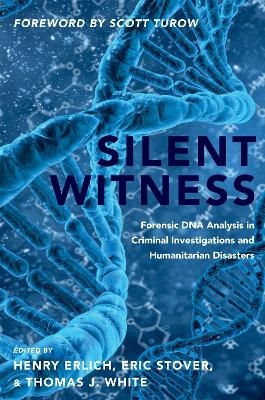
Silent Witness
Oxford University Press Inc (Verlag)
978-0-19-090945-1 (ISBN)
Told by over twenty experts in genetics, law, and social science, Silent Witness relates the history and development of modern DNA forensics and its application in both the courtroom and humanitarian settings. Across three thematic sections, Silent Witness tracks the scientific advances in DNA analysis and how these developments have affected criminal and social justice, whether through the arrests of new suspects, as in the case of the Golden State Killer, or through the ability to identify victims of war, terrorism, and human rights abuses, as in the cases of the disappeared in Argentina and the former Yugoslavia and those who perished during the 9/11 attacks.
By providing a critical inquiry into modern forensic DNA science, Silent Witness underscores the need to balance the benefits of using forensic genetics to solve crime with the democratic right to safeguard against privacy invasion and unwarranted government scrutiny, and raises the question of what it means to be an autonomous individual in a world where the most personal elements of one's identity are now publicly accessible.
Henry Erlich is Senior Scientist at the Benioff Children's Hospital Oakland Research Institute. He was previously Vice President of Discovery Research at Roche Molecular Systems and Director of Human Genetics at Cetus Corporation. He is a pioneer in the development and application of PCR in forensic DNA analysis and performed the first DNA-based forensic analysis in the United State in 1986 and the first DNA-based exoneration in 1988. Erlich also pioneered the development of DNA-based HLA typing and its application to the study of the genetics of autoimmune diseases. He is the author of over 450 scientific articles and has been the recipient of numerous awards, including the "DNA Profiles in Courage Award" from the National Institute of Justice in 2001. Eric Stover is Faculty Director and Adjunct Professor of Law and Public Health at the Human Rights Center, School of Law, University of California, Berkeley. Since the 1980s, he has led forensic missions to investigate the fate of the disappeared in Argentina, Guatemala, Brazil, El Salvador, Mexico, Iraq, the former Yugoslavia, and Rwanda. In 1984, Stover testified about the forensic search for the disappeared in the trial of Argentina's former ruling junta. He is the author and co-editor of several books on the forensic sciences and human rights and has co-produced several documentaries, including the 2017 PBS three-part series "Dead Reckoning: War, Crime, and Justice from World War II to the War on Terror." Thomas J. White is an advisor to the Human Rights Center, School of Law, University of California, Berkeley, and former 2012-2013 Regents Lecturer at the University of California, Berkeley. He previously held the positions of Vice President of Research at Cetus Corporation, Senior Vice President of Research & Development at Roche Molecular Systems, and Chief Scientific Officer at Celera Corporation. He is co-editor of four books on DNA analysis, two published by Academic Press and two by the American Association for Microbiology Press, and is co-author on 100 articles in peer-reviewed scientific and medical journals.
TABLE OF CONTENTS
Foreword by Scott Turow
Acknowledgments
List of Contributors
Introduction: Genetics for Justice
PART I: DNA Technology and Individual Identification
1. In the Beginning: Forensic Applications of DNA Technologies
Henry Erlich
2. Exonerating the Wrongfully Convicted
Justin Brooks and Desiree Moshayedi
3. Analysis of Forensic Mixtures
Michael Coble, Bruce Budowle, and Henry Erlich
4. Forensic DNA Data Banks and Data Mining: The Balance Between Privacy Interests and Public Safety
Frederick R. Bieber
5. Recent Developments in Forensic DNA Technology
Henry Erlich, Cassandra Calloway, and Steven Lee
6. Microbial Forensics: Concepts and Application from Epidemiology to Crime Investigations
Antti Sajantila and Bruce Budowle
PART II: Human Rights and Humanitarian Disasters
7. The Living Disappeared: Forensic DNA Typing and the Search for Argentina's Stolen Children
Mariana Herrera Pinero, Eric Stover, Melina Tupa, and Victor B. Penchaszadeh
8. Disappeared, Not Lost: Finding El Salvador's Missing Children
Andrea Lampros, Montserrat Martinez Gomez, Cristian Orrego Benavente, and Patricia Vasquez Marias
9. Large Scale Identification of the Missing: Experiences and Perspectives of the International Commission on Missing Persons
Andreas Kleiser and Thomas J. Parsons
10. Tracing Windblown Seeds: Genetic Information as a Biometric for Tracking Migrants in the United States
Sara H. Katsanis
11. Preventing a Third Death: Identification of Missing Migrants at the US-Mexico Border
Sara H. Katsanis and Katherine M. Spradley
12. Taking Stock: DNA Testing and Its Complex Truths
Dawnie Steadman and Sarah Wagner
PART III: Challenges and Debates
13. Admissibility of DNA Evidence in Court
Andrea Roth
14. Immediacy and Authority: Identification Efforts in Bosnia and Herzegovina and the World Trade Center Compared
Amy Mundorff and Sarah Wagner
15. Forensic Genetics, Ethics, Privacy, and Public Policy
Thomas J. White and Steven B. Lee
Conclusion: The Future of Forensic DNA Analysis
Index
| Erscheinungsdatum | 26.10.2020 |
|---|---|
| Vorwort | Scott Turow |
| Verlagsort | New York |
| Sprache | englisch |
| Maße | 155 x 231 mm |
| Gewicht | 567 g |
| Themenwelt | Studium ► 2. Studienabschnitt (Klinik) ► Rechtsmedizin |
| Naturwissenschaften ► Biologie ► Genetik / Molekularbiologie | |
| Recht / Steuern ► Strafrecht ► Kriminologie | |
| Sozialwissenschaften ► Politik / Verwaltung | |
| ISBN-10 | 0-19-090945-5 / 0190909455 |
| ISBN-13 | 978-0-19-090945-1 / 9780190909451 |
| Zustand | Neuware |
| Informationen gemäß Produktsicherheitsverordnung (GPSR) | |
| Haben Sie eine Frage zum Produkt? |
aus dem Bereich


